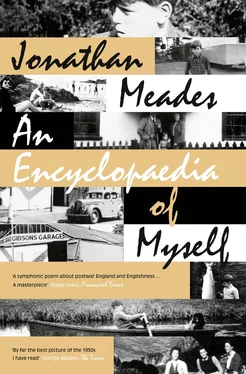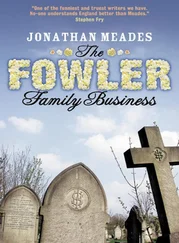Period product inventory. Hairy cardboard boxes; hairy Izal toilet paper; Weston’s Wagon Wheels; Nestlé’s segmental chocolate bars with green mint filling and green wrappers, Fry’s segmental chocolate bars with white mint filling and navy wrappers; Fry’s Turkish Delight; Crosse & Blackwell Russian Salad; Trex; Robinsons Lemon Barley Water; Kia-Ora (which meant good health – it was everyone’s single word of Maori); Walls’ disgusting pork sausages; Millers’ even more disgusting pork pies; Smiths Crisps (which often weren’t); parlously balanced displays of Daz, Omo, Persil; Weetabix, Grape-Nuts (for the cleaner colon), Welgar Shredded Wheat from Welwyn Garden City (the name suggested a corner of paradise); Keillers butterscotch; individual fruit pies; Lyle’s Golden Syrup (Out of the strong came forth sweetness); packet soups; tinned soups, fruit salad and cling peaches; bottled sauces – A.1., HP, OK, Daddies, Heinz Salad Cream and ketchup; cut flowers in dank water according to season; glass jars of Black Jacks, bullseyes, aniseed balls, licorice allsorts and shrill boiled sweets; scrubbing brushes; Oxo and Bovril; Rowntree’s Fruit Gums (which caused mouth ulcers) and Fruit Pastilles (which didn’t); baskets of wasp-bored apples and blighted vegetables; towers of biscuits; Camp Coffee; Shipham’s Paste; Sandwich Spread; Sun-Pat peanut butter (smooth – crunchy was still far in the future); Energen rolls and Dutch rusks; red Edam, mousetrap henges, St Ivel lactic cheese and Dairylea; Nestlé condensed milk (sweetened for instant sick), Ideal Milk (evaporated); Spangles and Refreshers; stacks of the Salisbury Journal , the Salisbury Times , Harnham Parish Magazine .
Dun split peas in burlap sacks seemed hopelessly old-fashioned among the gaudily packaged products of the first age of food colouring.
By the summer of 1956 an up-to-the-minute freezer had been wedged into a corner beside the slicer and window display to store ice cream, Koola Frutas, Mivvis, Birds Eye fish fingers, Findus fish cakes, Ross peeled prawns and fish and chips in a box designed to resemble crumpled newspaper – a Mudd Pack by H. Mudd & Sons of Grimsby. All this and much more was contained in a shop hardly larger than the combined front and dining rooms of the houses in the adjacent terrace. Mr Hand (cleaner-shaven than his wife, wirewool hair en brosse) had two assistants: the severe, bespectacled Mr Weston (grocer’s stripes) and the chummy one (grocer’s stripes). They wore long tan warehouse coats. They edged nimbly through canyons of boxes. They clambered daintily over teetering crates. Customers were less practised in negotiating the multiple obstacles. When more than eight people were in the store things went tumbling because of the squash. Everyone was so close you smelled your ripe neighbour. No gossipy whisper went unheard.
Midday, early September 1956. I was waiting in the bunched queue to be served from the freezer when a woman in a pacamac squeezed into the shop, causing the bell on a spring to ring. There was the usual murmur of ‘Good morning or [polite laughter] is it afternoon already?’ The pacamac took her place at the back of the queue. And that would have been that had she not espied the fat-arsed woman in front of me. She busied through. She spoke in hush-voice to her friend’s ear.
‘Did you hear … terrible … Dr Laing’s little boy … they don’t know if he was thrown off … fell he could have fell … he fell on his head … his own pony … brand-new … he had one of those hats on cap things but … in the field behind their house … where the barn is … the ambulance took him up Odstock … too late they said … nothing they could do to save the little mite nothing … didn’t regain you know … died in the theatre …’ fn1
She wasn’t as hugger-mugger as she believed.
The shop fell silent.
Thus I learnt that Jeremy Laing had been killed. He was my first friend to die. I thought of his nice wise face and his thick round glasses and his quizzical earnestness and the strain of mockery he got from his father. I dawdled home with my lolly – now somehow shameful, undeserved.
There were, as usual, the gusts of stinging sourness from Hawk Bowns’s dairy, of scorched horn from Curtis’s smithy. I loitered outside Sid the Butcher’s shop: unburdened by horrible knowledge he was, as usual, sawing and gabbing. Sid the Butcher’s bicycle’s rear wheel’s translucent plastic veil to protect his mac from spray that escaped the mudguard was, as usual, crazed and engrimed. Mr Thick the Drowner grunted, as usual, through his abundantly encrusted moustache. The wicket fence that supported his arthritic bones was, as usual, rotten and miraculously vertical. Ian Horn’s parents’ front garden was, as usual, full of axles, tarpaulins and buckets. The Lovely Queenie’s rouge was, as usual, like a scary clown’s. The russet fur round the collar of her peplum’d serge jacket was, as usual, thick as a bush. Iridescent feathers glinted, as usual, in her hat. She greeted me, as usual, with her blowsy cackle and her former-barmaid-trying-but-failing-to-make-comeback leer. Even though it was a minute further from her house than the R & C, The Lovely Queenie was, as usual, off to The Swan for her lunchtime noggin. Old Street’s ragged metalled surface was succeeded, as usual, by muddy gravel, cinders and puddles. The alley off it that was also a drain flowed with foul leucous liquid, as usual. In the small square of reeking rookeries it led to the pye-dogs howled, as usual.
This was all wrong.
Someone had ceased to exist in the form he had enjoyed till earlier that morning, had stopped being a person, had made a monumental shift into a state that wasn’t a state.
Yet this routine itinerary’s stages, scents and personae had not changed. Nor had the way I perceived them changed. There was no revealed acknowledgment that he was dead. What did I expect? Wilting flowers? The collapse of Mr Thick’s fence? A shocking fact was hidden in my head. That it had no effect on the exterior world signified that world’s heartlessness. I tried to calculate where Jeremy was now, what he was now. Was he a void? And was a void like a vacuum? Probably. Where he had been there was nothing – but where was this freshly created nothingness to be found? How did lack and emptiness manifest? Did a hole appear in the sky with nothing beyond it? Was he going to heaven? If so, had he already got there? How long did the journey take? Did it begin immediately after death?
Jeremy won’t be round to play again, to go out in the boat again, to row upstream to Alligator Island again. I went through the high gate between the brick sheds into the garden. Crazy-paved path, two fruit trees, hurdle fences, cotoneaster hedge, wallflowers and currants, sandpit I’d grown out of just as I would grow out of short trousers, cowboys, water pistols, Jokari, sport, War Picture Library, sleeping with a night light. All of which Jeremy would never grow out of. He was condemned to be forever frozen in Aertex and Startrite.
My father was already home. So I remained mute. Over lunch I volunteered nothing of what I knew. It was too embarrassing a subject to broach. Even had I wanted to blurt out the news I wouldn’t have known how to. I lacked the moral means to contravene the etiquette of silence he decreed. And, besides, the start of each academic year brought into my mother’s class new pupils, a catalogue of whose foibles and quirks she treated us to. My father and I ate, she picked at her food and talked. After lunch she returned to the C of E primary school a couple of minutes’ walk away.
My father went to his den to do his ‘writing’. On a 1930s Remington he typed, in multiplicate, the orders he had written down by hand in the shops he had called on that morning. Later in the afternoon one copy of the orders would be posted to Southampton, a second to Bristol, a third to Liverpool, the headquarters of William Crawford and Sons, where Brigadier Sir Douglas Crawford DSO (1904–1981), Lord Lieutenant of Merseyside (1974–1979), presided over the great baking empire. He lived, surrounded by imperial Chinese gewgaws, at Fernlea, an Edwardian barrack between Sefton Park and Mossley Hill. He shared it and a house in Marbella, Costa Lotta, with his widowed sister, Jessie. He never found the right girl.
Читать дальше












